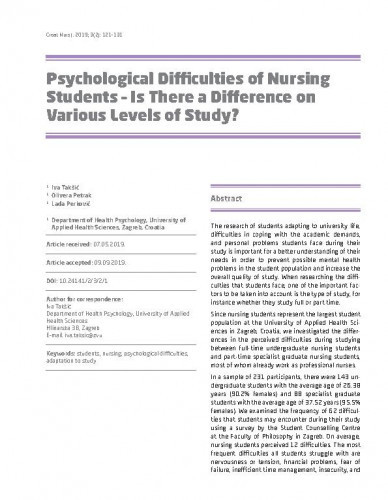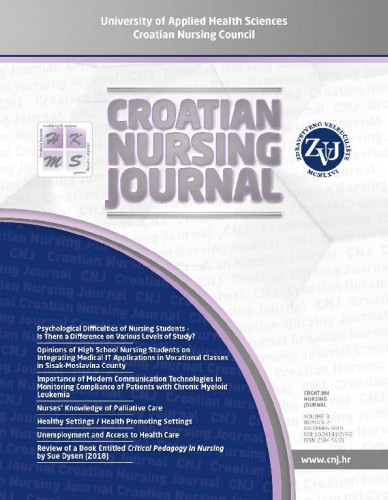The research of students adapting to university life, difficulties in coping with the academic demands, and personal problems students face during their study is important for a better understanding of their needs in order to prevent possible mental health problems in the student population and increase the overall quality of study. When researching the difficulties that students face, one of the important factors to be taken into account is the type of study, for instance whether they study full or part time. Since nursing students represent the largest student population at the University of Applied Health Sciences in Zagreb, Croatia, we investigated the differences in the perceived difficulties during studying between full-time undergraduate nursing students and part-time specialist graduate nursing students, most of whom already work as professional nurses. In a sample of 231 participants, there were 143 undergraduate students with the average age of 26.38 years (90.2% females) and 88 specialist graduate students with the average age of 37.52 years (95.5% females). We examined the frequency of 62 difficulties that students may encounter during their study using a survey by the Student Counselling Centre at the Faculty of Philosophy in Zagreb. On average, nursing students perceived 12 difficulties. The most frequent difficulties all students struggle with are nervousness or tension, financial problems, fear of failure, inefficient time management, insecurity, and changes in eating habits. There is no significant difference in the total frequency of perceived difficulties between undergraduate and graduate students but we found significant differences between these two groups in the number of students who encountered particular difficulties regarding 13 issues.; Istraživanja prilagodbe i problema s kojima se susreće studentska populacija važna su za bolje razumijevanje studentskih potreba, povećanje kvalitete studiranja te poboljšanje mentalnog zdravlja samih studenata. Poteškoće s kojima se studenti najviše susreću raznolike su, a važan faktor o kojem treba voditi računa jest i sam način studiranja. Zanimala nas je razlika u problemima prilagodbe kod studenata redovnoga stručnog studija i specijalističkoga (diplomskog) studija sestrinstva, kao jednog od najbrojnijih studija na Zdravstvenom veleučilištu. Na uzorku od 231 sudionika ispitali smo učestalost pojavljivanja različitih poteškoća s kojima se tijekom studija suočavaju studenti preddiplomskog (N = 143) i diplomskog studija sestrinstva (N = 88), primijenivši anketu koju nam je ustupilo Savjetovalište za studente FFZG-a. Prosječna dob sudionika redovnoga stručnog studija iznosi 26,38 godina (21 – 47), pri čemu među njima prevladavaju studentice (90,2 %), dok je prosječna dob sudionika specijalističkoga (diplomskog) studija sestrinstva 37,52 godine (23 – 56) te isto tako prevladava ženski spol (95,5 %). Studenti sestrinstva u prosjeku navode 12 poteškoća, a najčešće su nervoza ili napetost, financijski problemi, strah od neuspjeha u studiju, neracionalna upotreba vremena te promjene u navikama hranjenja i nesigurnost. Studenti preddiplomskog i diplomskog studija znatno se razlikuju po 13 poteškoća, ali ne i u ukupnom broju poteškoća koje ih muče. Najizrazitije razlike dobivene su za probleme sa sustanarima, komunikaciju s profesorima za preddiplomske te za financijske probleme i prilagodbu režimu studiranja za diplomske studente. U slučaju poteškoća, 65,4 % studenata potražilo bi besplatnu psihološku pomoć, pri čemu znatno više studenata diplomskog studija, a na traženje pomoći spremniji su studenti s većim brojem poteškoća.
Sažetak

 Croatian nursing journal : 3,2(2019) / glavna urednica, editor in chief Snježana Čukljek.
Croatian nursing journal : 3,2(2019) / glavna urednica, editor in chief Snježana Čukljek.